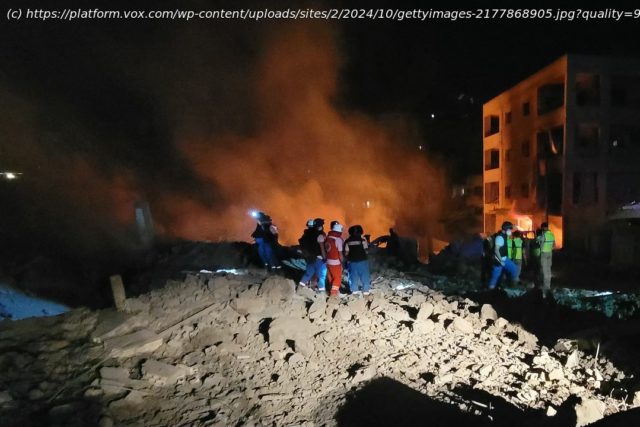After Yahya Sinwar’s death, is a ceasefire in Gaza more likely?
In the year following Hamas’s October 7 attacks on Israel, there has only been one successful pause in hostilities: a week in November during which Hamas traded 110 Israeli captives for 240 Palestinian prisoners.
Since then the Biden administration has repeatedly touted ceasefire deals that have gone nowhere — both between Israel and Hamas and, more recently, between Israel and Hezbollah, the Lebanese Shia militia that is fighting an Israeli invasion in southern Lebanon.
Other parties have tried as well. The United Nations has attempted multiple times to secure a ceasefire resolution, though the US either vetoed or abstained on each. In September, France and the US tried to advance a 21-day pause in hostilities between Israel and Hezbollah in southern Lebanon. Both Hezbollah and the Israeli government refused that proposal.
The cost of those failures has been high. At this point, more than 40,000 Palestinians have been killed in Gaza. Israel has expanded its war to Lebanon, killing nearly 2,000 people there, and violence has increased in the West Bank. Israel is also weighing its response to an Iranian attack earlier this month, in which around 180 missiles landed in Israeli territory.
Unlike previous Israeli conflicts, there doesn’t appear to be any end to the war in sight, at least not through diplomatic means. The recent death of Hamas leader Yahya Sinwar could provide an opening for renewed talks, but the same core issues remain.Israel, Hamas, and Hezbollah can’t agree to a ceasefire because they’re at cross purposes
The short answer for why ceasefire talks have failed is that each of the three parties directly involved in the regional conflict — Hamas, Israel, and Hezbollah — have demands that their would-be negotiating partner is unwilling, or unable, to meet.
When it comes to Israel’s conflict with Hamas, the country’s demands have been both evolving and abstract. Israeli Prime Minister Benjamin Netanyahu reportedly torched a potential July ceasefire agreement with Hamas by insisting that Israeli troops maintain a permanent presence in Gaza, and that Israel would continue to have control of the Gaza/Egypt border.
Those are much bigger — and more unrealistic — asks than previous demands for the return of Israeli hostages in Gaza, which is what the initial ceasefire conversations revolved around. And more broadly, Israel’s goals in Gaza are somewhat subjective: Israeli leaders have repeatedly said they want to completely eliminate Hamas’s military and governing capacities, a goal Hamas has obviously rejected, and which US officials have said is unlikely.
It’s very difficult to eradicate a political ideology, which is what Hamas is at its essence, and Israel has not made clear under what conditions it will feel satisfied its goals are met — whether that means the death or capture of major leaders, the dismantling of outside support, total Israeli occupation of Gaza, or some other scenario.
“It seems clearer to me what the Israeli government considers unacceptable than what it considers acceptable,” Jon Alterman, director of the Middle East program at the Center for Strategic and International Studies, told Vox. “The challenge it will have is keeping an eye on what is achievable and sustainable. Both are surely less than what the government wants.”
Similarly, Israel’s stated goal in its conflict with Hezbollah — to ensure the group is unable to attack Israel like Hamas did on October 7 — is opaque. That could mean anything from pushing the group a certain distance from Israel’s northern border to pushing regime change in Lebanon.
Israel is unlikely to be able to dismantle Hezbollah totally, but its goal may be to shift the balance of power in its decades-long conflict with the organization.
“This time around, with the damage they’ve done to Hezbollah and with the direct fighting between Israel and Iran, Israel was hoping to fundamentally change the threat that the Iranian proxies [like Hamas and Hezbollah] pose to Israel,” Natan Sachs, director of the Middle East program at the Brookings Institution, told Vox.






